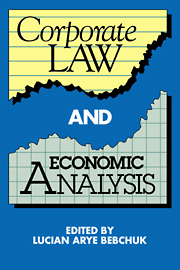Book contents
- Frontmatter
- Contents
- List of contributors
- Introduction
- Acknowledgments
- 1 Mergers, acquisitions, and leveraged buyouts: an efficiency assessment
- 2 Discounted share prices as a source of acquisition gains
- 3 Ties that bond: dual class common stock and the problem of shareholder choice
- 4 Property rights in assets and resistance to tender offers
- 5 A new approach to corporate reorganizations
- 6 The corporate contract
- 7 The state competition debate in corporate law
- 8 The positive role of tax law in corporate and capital markets
- 9 Ownership of the firm
- Index
7 - The state competition debate in corporate law
Published online by Cambridge University Press: 15 December 2009
- Frontmatter
- Contents
- List of contributors
- Introduction
- Acknowledgments
- 1 Mergers, acquisitions, and leveraged buyouts: an efficiency assessment
- 2 Discounted share prices as a source of acquisition gains
- 3 Ties that bond: dual class common stock and the problem of shareholder choice
- 4 Property rights in assets and resistance to tender offers
- 5 A new approach to corporate reorganizations
- 6 The corporate contract
- 7 The state competition debate in corporate law
- 8 The positive role of tax law in corporate and capital markets
- 9 Ownership of the firm
- Index
Summary
A perennial issue in corporate law reform is the desirability of a federal system. For notwithstanding the invasive growth of regulation by the national government, principally through the federal securities laws, corporate law is still the domain of the states. While no two corporation codes are identical, there is substantial uniformity across the states. Provisions typically spread in a discernible S-shaped pattern, as one state amends its code in response to another state's innovation. The revision process is often analogized in the academic literature to market competition, in which states compete to provide firms with a product, corporate charters, in order to obtain franchise tax revenues. This characterization is the centerpiece of the federalism debate in corporate law – whether competition, and hence a federal system, benefits shareholders. The hero – or culprit – in the debate is Delaware, the most successful state in the market for corporate charters.
Delaware's preeminence and its impact on who benefits from competition is the subject of this chapter, which is essentially a survey of recent learning on state competition. After a sketch of the conventional moves in the state competition debate, I summarize a transaction cost explanation for Delaware's success. Next, I briefly examine a controversial subset of state laws – antitakeover statutes – whose problematic place in corporation codes muddies the debate. Thereafter, I review the findings of empirical studies that have sought to arbitrate the state competition debate by employing financial econometric techniques.
- Type
- Chapter
- Information
- Corporate Law and Economic Analysis , pp. 216 - 254Publisher: Cambridge University PressPrint publication year: 1990
- 12
- Cited by



